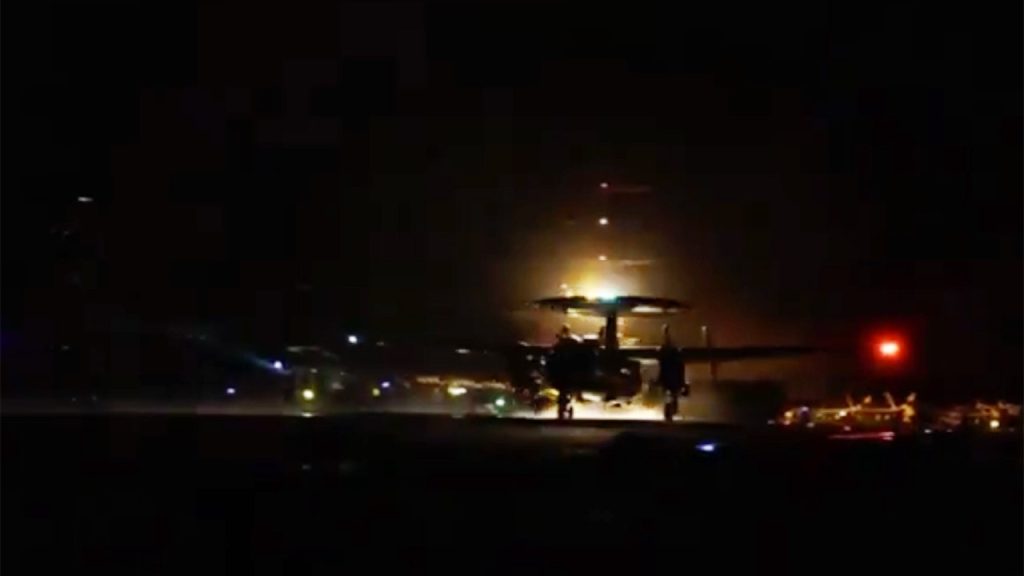The United States military confirmed carrying out precision airstrikes in Yemen targeting Houthi rebel infrastructure. These strikes, announced by U.S. Central Command (CENTCOM), were aimed at disrupting and degrading the operational capabilities of the Iran-backed Houthi movement, specifically their attacks on U.S. Navy warships and commercial vessels navigating crucial waterways like the Southern Red Sea, Bab al-Mandeb Strait, and the Gulf of Aden. CENTCOM released footage showcasing the involvement of F/A-18 fighter jets in the operation, and confirmed the utilization of both naval and air force assets. The strikes underscore CENTCOM’s commitment to safeguarding U.S. and allied personnel, regional partners, and the freedom of international maritime traffic.
The airstrikes come in response to a surge of attacks by Houthi militants against shipping in these strategic waters. The Houthis have openly declared their intention to continue these attacks until Israel ceases its military operations in Gaza. This escalation marks a dangerous trend in the region, significantly increasing the risks to international trade and maritime security. The Houthis’ campaign of disruption against commercial shipping began following the outbreak of the Israel-Hamas war in October 2023 and since then, they have targeted over 100 merchant vessels, posing a grave threat to global trade and regional stability.
The U.S. military’s intervention highlights the complex dynamics at play in the region. While the United States has avoided direct engagement in the conflict between Israel and Hamas, it has maintained a strong stance against the Houthi rebels in Yemen, who are seen as a destabilizing force in the region. The U.S. has repeatedly condemned the Houthi attacks on shipping and has vowed to protect the freedom of navigation in these critical waterways. The airstrikes demonstrate a willingness to take decisive action to protect U.S. interests and those of its allies, while simultaneously attempting to avoid getting entangled in the Israeli-Palestinian conflict.
However, the U.S. approach has drawn criticism both domestically and internationally. Some argue that the U.S. focus on the Houthis deflects attention from the root causes of the ongoing conflict in the region, including the unresolved Israeli-Palestinian issue. Others express concern that military intervention could escalate tensions and further destabilize the region, potentially leading to unintended consequences. Critics also contend that the airstrikes might not be an effective long-term solution to address the underlying issues driving the Houthi behavior, and instead advocate for a more comprehensive diplomatic approach involving all stakeholders in the region.
The Houthi attacks on shipping have not only disrupted international trade and caused economic losses but have also raised concerns about potential environmental catastrophes. The targeting of oil tankers and other vessels carrying hazardous materials poses a significant risk of oil spills and other environmental disasters, which could have devastating consequences for the region’s marine ecosystem and the livelihoods of those who depend on it. The international community has expressed growing concern about the humanitarian implications of the conflict in Yemen, which has already caused a severe humanitarian crisis. The continued attacks on shipping could further exacerbate the situation by disrupting the delivery of essential goods and aid to the affected population.
The U.S. airstrikes represent a significant development in the ongoing conflict in Yemen and reflect the complexities of the regional security landscape. While the immediate impact of the strikes remains to be seen, they are likely to have far-reaching consequences for the region. The U.S. administration will need to carefully navigate the political and diplomatic landscape to avoid further escalation and to work towards a peaceful resolution of the conflict. The international community must also play a more active role in addressing the root causes of the conflict and promoting a sustainable peace in the region. The focus should be on finding a comprehensive diplomatic solution that addresses the legitimate concerns of all parties involved, including the Houthis, the Yemeni government, and the regional powers. A coordinated international effort is crucial to mitigate the humanitarian crisis, ensure the safety of maritime navigation, and prevent further escalation of the conflict.


